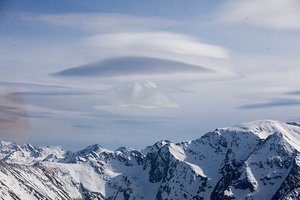- published: 26 Jul 2011
- views: 59959
-
remove the playlistVoiled Kraken (saturn Mode) Data
-
remove the playlistLongest Videos
- remove the playlistVoiled Kraken (saturn Mode) Data
- remove the playlistLongest Videos

Kraken
The Kraken (/ˈkreɪkən/ or /ˈkrɑːkən/) is a legendary sea monster of giant size that is said to dwell off the coasts of Norway and Greenland. A number of authors over the years have postulated that the legend originated from sightings of giant squids that may grow to 12-15 meters (40-50 feet) in length, despite the fact that the creature in the original tales was not described as having tentacles and more closely resembled a whale or crab. The sheer size and fearsome appearance attributed to the kraken have made it a common ocean-dwelling monster in various fictional works.
Etymology
The English word kraken is taken from Norwegian. In Norwegian and Swedish, Kraken is the definite form of krake, a word designating an unhealthy animal or something twisted (cognate with the English crook and crank). In modern German, Krake (plural and declined singular: Kraken) means octopus, but can also refer to the legendary kraken.
History
In the late-13th-century version of the Old Icelandic saga Örvar-Oddr is an inserted episode of a journey bound for Helluland (Baffin Island) which takes the protagonists through the Greenland Sea, and here they spot two massive sea-monsters called Hafgufa ("sea mist") and Lyngbakr ("heather-back"). The hafgufa is believed to be a reference to the kraken:
This article is licensed under the Creative Commons Attribution-ShareAlike 3.0 Unported License, which means that you can copy and modify it as long as the entire work (including additions) remains under this license.
Mode
Mode (Latin: modus meaning "manner, tune, measure, due measure, rhythm, melody") may refer to:
Language
- Narrative mode, the type of method voice and point of view used to convey a narrative
- Modes of persuasion, oratorical devices
Music
- Modus (medieval music)
- Gregorian mode, a system of modes used in Gregorian chant (as opposed to ancient Greek modes or Byzantine octoechos)
- Gregorian mode, a system of modes used in Gregorian chant (as opposed to ancient Greek modes or Byzantine octoechos)
This article is licensed under the Creative Commons Attribution-ShareAlike 3.0 Unported License, which means that you can copy and modify it as long as the entire work (including additions) remains under this license.

Saturn
Saturn is the sixth planet from the Sun and the second-largest in the Solar System, after Jupiter. It is a gas giant with an average radius about nine times that of Earth. Although only one-eighth the average density of Earth, with its larger volume Saturn is just over 95 times more massive. Saturn is named after the Roman god of agriculture; its astronomical symbol (♄) represents the god's sickle.
Saturn's interior is probably composed of a core of iron–nickel and rock (silicon and oxygen compounds). This core is surrounded by a deep layer of metallic hydrogen, an intermediate layer of liquid hydrogen and liquid helium, and finally outside the Frenkel line a gaseous outer layer. Saturn has a pale yellow hue due to ammonia crystals in its upper atmosphere. Electrical current within the metallic hydrogen layer is thought to give rise to Saturn's planetary magnetic field, which is weaker than Earth's, but has a magnetic moment 580 times that of Earth due to Saturn's larger size. Saturn's magnetic field strength is around one-twentieth of Jupiter's. The outer atmosphere is generally bland and lacking in contrast, although long-lived features can appear. Wind speeds on Saturn can reach 1,800 km/h (500 m/s), higher than on Jupiter, but not as high as those on Neptune.
This article is licensed under the Creative Commons Attribution-ShareAlike 3.0 Unported License, which means that you can copy and modify it as long as the entire work (including additions) remains under this license.
Data
Data (/ˈdeɪtə/ DAY-tə, /ˈdætə/ DA-tə, or /ˈdɑːtə/ DAH-tə) is a set of values of qualitative or quantitative variables; restated, pieces of data are individual pieces of information. Data is measured, collected and reported, and analyzed, whereupon it can be visualized using graphs or images. Data as a general concept refers to the fact that some existing information or knowledge is represented or coded in some form suitable for better usage or processing.
Raw data, i.e. unprocessed data, is a collection of numbers, characters; data processing commonly occurs by stages, and the "processed data" from one stage may be considered the "raw data" of the next. Field data is raw data that is collected in an uncontrolled in situ environment. Experimental data is data that is generated within the context of a scientific investigation by observation and recording.
The Latin word "data" is the plural of "datum", and still may be used as a plural noun in this sense. Nowadays, though, "data" is most commonly used in the singular, as a mass noun (like "information", "sand" or "rain").
This article is licensed under the Creative Commons Attribution-ShareAlike 3.0 Unported License, which means that you can copy and modify it as long as the entire work (including additions) remains under this license.
- Loading...

-
 42:49
42:49Chapter 13 - Walden by Henry David Thoreau - House-Warming
Chapter 13 - Walden by Henry David Thoreau - House-WarmingChapter 13 - Walden by Henry David Thoreau - House-Warming
Chapter 13: House-Warming. Classic Literature VideoBook with synchronized text, interactive transcript, and closed captions in multiple languages. Audio courtesy of Librivox. Read by Gord Mackenzie. Playlist for Walden by Henry David Thoreau: http://www.youtube.com/playlist?list=PL2958A8F53619D3F2 Walden free audiobook at Librivox: http://librivox.org/walden-by-henry-david-thoreau/ Walden free eBook at Project Gutenberg: http://www.gutenberg.org/ebooks/205 Walden at Wikipedia: http://en.wikipedia.org/wiki/Walden View a list of all our videobooks: http://www.ccprose.com/booklist
-

Chapter 13 - Walden by Henry David Thoreau - House-Warming
Chapter 13: House-Warming. Classic Literature VideoBook with synchronized text, interactive transcript, and closed captions in multiple languages. Audio courtesy of Librivox. Read by Gord Mackenzie. Playlist for Walden by Henry David Thoreau: http://www.youtube.com/playlist?list=PL2958A8F53619D3F2 Walden free audiobook at Librivox: http://librivox.org/walden-by-henry-david-thoreau/ Walden free eBook at Project Gutenberg: http://www.gutenberg.org/ebooks/205 Walden at Wikipedia: http://en.wikipedia.org/wiki/Walden View a list of all our videobooks: http://www.ccprose.com/booklist
published: 26 Jul 2011

Chapter 13 - Walden by Henry David Thoreau - House-Warming
- Order: Reorder
- Duration: 42:49
- Updated: 26 Jul 2011
- views: 59959
- published: 26 Jul 2011
- views: 59959
-

Chapter 13 - Walden by Henry David Thoreau - House-Warming
Chapter 13: House-Warming. Classic Literature VideoBook with synchronized text, interactive transcript, and closed captions in multiple languages. Audio courtesy of Librivox. Read by Gord Mackenzie. Playlist for Walden by Henry David Thoreau: http://www.youtube.com/playlist?list=PL2958A8F53619D3F2 Walden free audiobook at Librivox: http://librivox.org/walden-by-henry-david-thoreau/ Walden free eBook at Project Gutenberg: http://www.gutenberg.org/ebooks/205 Walden at Wikipedia: http://en.wikipedia.org/wiki/Walden View a list of all our videobooks: http://www.ccprose.com/booklist
published: 26 Jul 2011

Chapter 13 - Walden by Henry David Thoreau - House-Warming
- Order: Reorder
- Duration: 42:49
- Updated: 26 Jul 2011
- views: 59959
- published: 26 Jul 2011
- views: 59959



Chapter 13 - Walden by Henry David Thoreau - House-Warming
- Report rights infringement
- published: 26 Jul 2011
- views: 59959


Chapter 13 - Walden by Henry David Thoreau - House-Warming
- Report rights infringement
- published: 26 Jul 2011
- views: 59959

Are aliens real? Grim discovery raises doubts about existence of extraterrestrial life
Edit Metro UK 05 Apr 2018YouTube Shooting Suspect's Family Warned Police About Her Anger At The Company
Edit WorldNews.com 04 Apr 2018Trump Considers Another $100 Billion in Tariffs Targeting China
Edit WorldNews.com 06 Apr 2018Oregon Governor Promises To Defy Trump Order To Send National Guard Troops to Border
Edit WorldNews.com 05 Apr 2018An Illinois town just banned assault weapons. The penalty if you keep one? Up to $1,000 a day
Edit CNN 05 Apr 2018Facebook sent a doctor on a secret mission to ask hospitals to share patient data
Edit Democratic Underground 06 Apr 2018TBI launches new crime data platform
Edit Lebanon Democrat 06 Apr 2018Facebook: Most users may have had public data 'scraped'
Edit Belleville News-Democrat 06 Apr 2018Facebook Not Paying $17,500 In Lawsuit Compensation To Users For Data Breach
Edit Inquisitr 06 Apr 2018Store data in India, RBI tells payments companies
Edit The Times of India 06 Apr 2018RBI asks payments companies to store data in India, may affect foreign players
Edit The Times of India 06 Apr 2018Facebook can’t catch a break: Medical data-sharing plan halted
Edit Ars Technica 06 Apr 2018Facebook’s Sneaky Plan To Get Medical Data From Hospitals And Match It Up With Users
Edit Inquisitr 06 Apr 2018UK, Australia Investigating Facebook Amid Cambridge Analytica Data Scandal
Edit Slashdot 06 Apr 2018Full Transcript: Facebook COO Sheryl Sandberg On Protecting User Data
Edit National Public Radio 06 Apr 2018Sheriff’s Department re-evaluating data release, crimemapping
Edit The Signal 06 Apr 2018Data of 5.6L Indians may have been breached: Facebook
Edit DNA India 06 Apr 2018Delta says data exposed “several hundred thousand” customers
Edit Denver Post 06 Apr 2018- 1
- 2
- 3
- 4
- 5
- Next page »



























